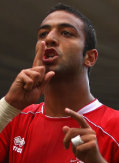 Here are some sounds from the playing fields of Europe on an average Sunday: “Bin Laden! You know where he is!” “Have you got a first-aid kit or is that a suicide bomb?” No, it’s not what Italy’s Marco Materazzi told France’s Zinedine Zidane in the World Cup final. It’s what a Muslim football team in Luton, England hears all the time.
Here are some sounds from the playing fields of Europe on an average Sunday: “Bin Laden! You know where he is!” “Have you got a first-aid kit or is that a suicide bomb?” No, it’s not what Italy’s Marco Materazzi told France’s Zinedine Zidane in the World Cup final. It’s what a Muslim football team in Luton, England hears all the time.
Yet Islamophobia is generally ignored. Nobody ever gets punished for it. After Newcastle supporters repeatedly chanted “Mido’s got a bomb” at Middlesbrough’s Egyptian striker in August, only one person was disciplined: Mido himself. He got a yellow card for running to the jeering fans with his finger to his lips after scoring.
Contrast this laxity with the multi-year ban on Blackburn fans caught abusing a black player, or with the anger in Britain when Chelsea manager Avram Grant experienced anti-Semitism, or when black England players were abused abroad. Piara Powar, head of the anti-racism group Kick It Out, believes people are more likely to “shrug” when Muslim players are abused than when blacks are. Powar says some think, “maybe they brought it on themselves”.
In all of Britain’s professional football, there are just a handful of British Muslims. Even Muslim spectators are so rare that when some north Africans and Iraqi Kurds bought tickets to watch Manchester United in 2004, it was assumed they wanted to blow up the stadium. Hundreds of police officers arrested the fans in dawn raids before the misunderstanding was cleared up.
Muslims are more common in amateur football, and so is Islamophobia. A study in west Yorkshire several years ago found that every Asian or black amateur interviewed had experienced racism. Just in case any religious Muslim women might want to play, Fifa recently banned them from doing so in hijab, supposedly for safety reasons, though so far no footballers have been killed by flying veils.
